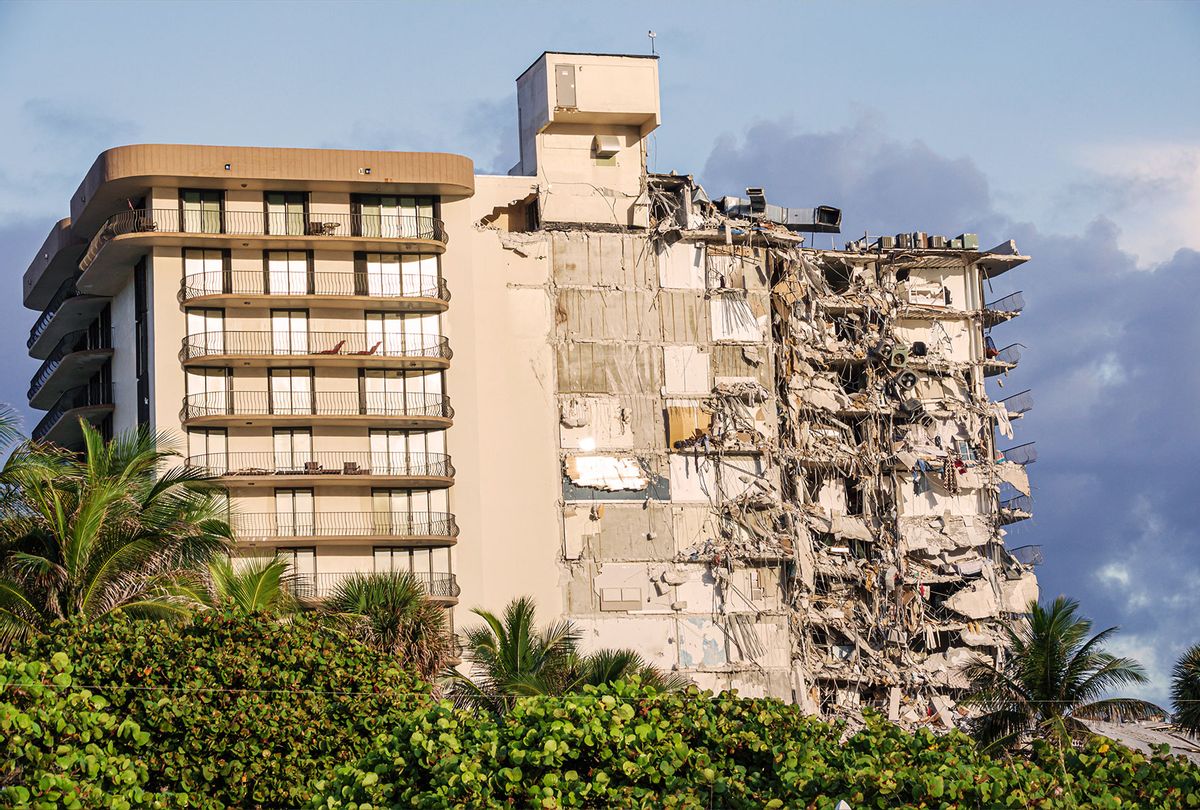The Champlain Towers South condo building in Surfside, Florida, collapsed last week, killing at least 18 people with 145 others unaccounted for. It's too soon to say whether climate change had anything to do with the tragedy. But the collapse has shone a spotlight on Florida's unique vulnerabilities to climate change and raised questions about whether the state's coastal infrastructure is equipped to handle the flooding that comes with sea-level rise.
The climate stakes for Floridians are high. By 2050, buildings in South Florida may be inundated by 2 to 3 feet of sea-level rise, plus 4 or more feet of storm surge. By 2100, the flooding will be even worse. Some counties might be able to afford to raise their roads and build sea walls. But adapting to rising seas is expensive, complicated, and, ultimately, unsustainable — especially in coastal states like Florida, which will experience intensifying Atlantic hurricanes in addition to sea-level rise.
Preventing future tragedies means acting now, said Randall W. Parkinson, a coastal geologist at Florida International University in Miami. He thinks it's already time to start thinking about moving residents away from the sea. A certain amount of sea-level rise is baked in, given current atmospheric carbon levels, he says. The longer Florida waits to organize the systematic withdrawal of people and assets from the coast, the more chaotic that eventual retreat will be.
This retreat-oriented attitude isn't widely shared in Parkinson's home state. When he gives presentations on the inevitability of mass migration inland from Florida's coast, attendees have verbally accosted him and called him "Dr. Doom" — a moniker he rejects. He's even received threatening messages at his house, he says. "It's just a terrible, terrible shame in this country how we've responded to climate change," he said. "There's no leadership."
Grist caught up with Parkinson to talk about climate change, the Surfside tragedy, and what Florida can do to prepare itself for what's coming down the pike. This interview has been condensed and lightly edited for clarity.
Q. Has the condo collapse made you think more urgently about rising seas?
A. One of the side effects of the tragedy of the condo collapse was people started to say, "Is this because of climate change?" Which is a fair question. But realistically, even if all of the buildings were resistant to the structural challenges of climate change, in 50 years most of them are going to be underwater anyway. It did bring to the front this issue of our coastal zone. How safe are we? How's our quality of life going to change under climate change?
To me, the collapse was a bellwether moment or a tipping point in the conversation, where for the first time, many more people are thinking more seriously about climate change in the coastal zone. Perhaps they're doing it for the wrong reason, in the sense that the collapse probably had nothing to do with climate change. But designing more resilient buildings and all that, it really depends on where you live. If your elevation is 20 feet or below and you live within a mile or two or three of the coastline, that zone is at high, high risk. Let's just say sea-level rise is going to be five feet, although I personally think that by the end of the century it'll be higher than that. But now, you have a storm on top of that that has a surge of 20 feet. So look up in the sky and imagine 25 feet and that's where the sea is going to be during a storm surge at the end of the century.
Q. Is climate change impacting Florida's infrastructure in other ways?
A. We're looking at flooding by sea-level rise, flooding by storm surge, and flooding by changes in precipitation patterns. There will be a longer dry season. But when the rains do come, they will be very heavy. And this will lead to flooding because Florida is a low-lying land, but also because of our infrastructure. A lot of it is designed for rainfall patterns that are of a historical nature. And if you have a stormwater drain that is draining into the ocean, but the oceans are rising, pretty soon the drain will be underwater, which is what is happening in Miami Beach. Saltwater is bubbling up through the drain systems.
In Miami Beach, when they wanted to do a little work on their stormwater drains and elevate the roads to reduce flooding, they just did a couple of miles and it was $500 million. If you're an affluent community with a very strong tax base, maybe you can implement these things. But if you don't have that, what are you going to do? And even if you're in a community that raises your roads and deals with your storm water, did the community next to you do that? Because if they didn't, then you can't get to your home anyway.
All the real estate on high land now is getting pricier and pricier. Traditionally, people who live not on the coast but behind the coast were people that didn't have the resources. So these areas that are now prime real estate targets because of climate change are being invested in, and the market's going up, and the taxes and the rents and all that. That process is called gentrification.
Q. Are politicians making progress on thinking about these climate-related issues?
A. We're making some progress. The state has a resilient coastlines program, it was funded a few years ago, which is when it finally put its toe into the water of climate change and sea-level rise. The program will continue to award grants to municipalities and counties to do what is the first step in preparing for climate change: Identify your risks.
There have now been 30 or 40 of these assessments completed through the state of Florida's resilient coastlines program. But then you have to implement that plan, and that's where it gets very challenging. How do you prioritize your list of things to do? Implementing the plan is a struggle in itself, but then where's the money going to come from? Nobody knows the answer to that. Nobody.
Q. So what can Floridians do to protect themselves against these future impacts?
A. Your options are: You do nothing, you adapt (which is a temporary fix because eventually these low-lying coastal areas are all going to be underwater), or, at some point, people are going to have to think about a managed withdrawal from the coastline. Right now, it wouldn't be managed; it would be total chaos.
A couple of years ago in the Florida panhandle, when hurricanes devastated the area, people said "We are resilient, we are going to go back in and rebuild." At some point, there may not be the will or the money. At some point, it's going to have to be, "We're just going to have to let that go and relocate." And how is that done? That is the question that we will be faced in the second half of this century. Because by 2050, sea levels will be a foot or two above present in most of Florida. So these current plans, they might hold the line for the next 30 years or so, but it's just going to be untenable after that. And people are going to have to begin to make plans for how to withdraw and to ensure equity in the transition.
Q. Managed retreat might be the long-term solution, but if people move, they're not going to do it right away. What can be done in the short term to prevent Florida's infrastructure from crumbling?
A. Mayors in Florida are suggesting that they're going to go in and reevaluate these buildings even if they're not 40 years old. That's a visual inspection of the property. I'm assuming that that would be things like revisiting the structural design elements of the building, looking at how the foundation was built, what were the pilings made out of, how deep did the pilings go, what they're going through or into, and so forth. And then at the end of that, you get what apparently the Surfside condo got in 2018: recommendations on how to move forward. I think that that is a very important first step.
We're really talking about two different time scales here: the next 20 or 30 years — let's just say the duration of a mortgage — and then beyond that. Obviously, we need to be doing things now, even if in the end they're not going to solve the problem. But we also need to be using this time to begin thinking about what the next step is so that you're not having to make that decision when you have a major catastrophe.




Shares